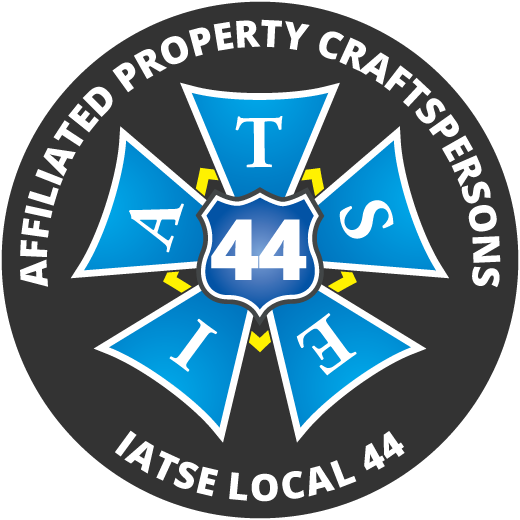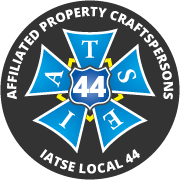CRAFTS: AN INTRODUCTION
As the film industry developed into a burgeoning new business, the flourishing studios had the resources to hire and retain the finest craftspersons in the world. Born out of this Hollywood Studio System was a tradition of unsurpassed excellence and integrity, of well-honed skills and innate talent, of veteran personnel and eager new workers -- the tradition of IATSE Local 44.
The varied craft divisions within this local evolved after much thought, energy, time and debate. And the evolution continues -- today the entire entertainment industry is in a state of flux due to the everchanging landscape of how the various studios are structured and do business, as well as to the extraordinary advances of technology. The present is always a product of the past, but these two eras -- "then" and "now" -- are quite different in a number of compelling ways.
Longtime members (some of whom were present when Local 44 received its official IATSE charter in 1939) remember the early days, when working for one studio for a lifetime was the rule, not the exception. The studios kept their core ranks continually employed; if one wasn't working on a film or television project, one was working on lot improvements. IA members even played important roles in constructing studio amusement park "spinoffs," such as Disneyland and the Universal Studios Tour.
At that time and until recently, seniority was the established rule, and members sometimes worked years before advancing to journeyman status. As a result, a member of the industry then traditionally received excellent on-the-job apprenticeship experience. Consequently, a member of that era tended to develop a much broader range of skills than his or her contemporary counterparts simply due to the diversity of work requests the member was expected to perform.
Members today tend to compartmentalize their skills, and focus on a more narrow area of expertise than in the past. Callboard seniority no longer exists -- a 30-day newcomer on the out-of-work list is afforded the same privileges as a 30-year veteran. Advancements now occur much more rapidly than they used to. And increasingly, as independent productions are organized, formerly non-IA employees work alongside industry stalwarts.
As a result, lines of responsibility have become blurred. Former non-union workers -- accustomed to the rough-and-tumble world of independent film production and multiple job duties that extended beyond their specific crafts -- now find themselves working within lines that are more firmly drawn in the IA. Conversely, union members face the challenge of interacting with new colleagues whose work experience is so different from their own.
While all of this sounds confusing, difficult and potentially adversarial, one should understand the necessary and underlying truth . . .
In the beginning, there was no book, no precedent, no rules set in stone. Various job jurisdictions evolved over time -- not out of a sense of provincialism, but because production crews sought out the best, most efficient delineation of responsibilities in the interest of a smooth-running production.
Today, the Studio System is no more. Producers feel an increased obligation to the bottom line and, as a result, there seems to be little appreciation or understanding for the traditions of old. Now, more than ever, the Affiliated Property Craftspersons themselves must tend to the ancestral flame.
It is up to each member to cherish and cultivate this tremendous legacy of which he or she is a part. Respect the foundation that was laid by taking the initiative to learn from those who can pass on skills which have been forged over a lifetime of dedication to these honorable crafts. Hopefully, today's newcomer will be worthy of passing on the torch to an equally deserving novice tomorrow.
Each of the following Craft Sections -- Construction Coordinator, Property (which includes Upholstery/Drapery/Sewing, Carpeting/Floor Covering and Greens), Property Master, Propmaker/Prop Shop, Set Decorator and Special Effects-- presents a general definition of that craft, a list of principal crew responsibilities, requirements for initiation, and a list of skills which have historically served these respective craftspersons in the past. Remember that these sections are merely rough sketches of the nuances and complexities of each craft, drawn from tradition, time, experience, trial and error, the spoken and written word and, of course, the IATSE contract.
Next is a list of Classification Codes, which provides an overview of relevant craft skills, certificates and licenses, as well as the Production Budgeting Guidelines -- a quick graph system of budgeting responsibilities for each craft department which has evolved out of tradition and past practices.
CONSTRUCTION COORDINATOR
The Construction Coordinator -- who schedules, supervises and coordinates the construction of sets for motion pictures and television projects -- is essentially the equivalent of a general contractor on the "outside." Like a general contractor, the Construction Coordinator estimates, budgets and builds. The major difference is in what Coordinators are asked to build, which could be anything from a typical American household, to a West African jungle, to a 1645 Pilgrim village, or an intergalactic space craft. Coordinators are also called upon to supervise the construction of furniture -- period, contemporary and futuristic.
An additional construction requirement beyond setbuilding is to adapt or add onto existing locations (one Construction Coordinator added three stories of open steel girders to the top of an existing 38 story high rise in the middle of downtown Los Angeles -- because the production needed a building which looked as if it were still under construction).
The Construction Coordinator staffs everyone on the Construction Crew, including Propmakers, Laborers, Plasterers and Painters, and oversees any Greenswork, Sculpting, Floorcovering, and Modeling (architectural pieces for the set). The Construction Coordinator handles much of the paperwork and acts as a liaison between the Production Manager and the Production Designer on all matters of construction. A Construction Coordinator's main goal is to bring the vision of the Production Designer to life within the project's budget.
Frequently, Coordinators are required to engineer the sets to accommodate camera access, lighting and special effects.
CONSTRUCTION COORDINATOR'S RESPONSIBILITIES. Because of his/her integral role, the Construction Coordinator is among the first hired production member. A more detailed outline of the Construction Coordinator's responsibilities follows:
• Staffs key positions for Construction Department -- General Foreman, Head Painter, Chief Sculptor, Labor Foreman, Toolman, Greensman, Plasterer -- and oversees all work.
• Estimates set construction costs and tracks production costs throughout the project.
• Finds appropriate building materials.
• Pulls any needed stock scenery (usually in the case of 1/2 hour and episodic television).
• Tends to crew safety concerns, and sees that the safety meetings are scheduled. Verifies that tools are in safe working order, and aren't missing safety guards. Arranges for standby medics and first-aid personnel as mandated by safety rules.
• Makes on-set decisions regarding craft responsibilities within the Construction Department.
• Acquires from Accounting a list of proper tracking numbers for time cards, purchase orders, and any other budgetary expenditures which the Accounting Department must follow during the course of production (sometimes referred to as S.T.N.'s -- "studio tracking numbers"). In television, the proper numbers are essential, as a Coordinator may be purchasing items and signing time cards for multiple shows during the same period -- each episode has its own set of tracking numbers.
• Oversees and signs all purchase orders, timecards, check requests and other paperwork related to the Construction Department.
• Researches and finds needed items as requested by the Production Designer.
• Supplies tools and scenery, as needed.
• Ensures overall quality of finished product.
STAFFING CONSIDERATIONS. It is particularly difficult to state any broad generalities for staffing considerations that a Construction Coordinator may follow. A few words might be spent on the issue of "Features vs Television vs Commercials." The staffing requirements are different inasmuch as the Construction Coordinator working in television generally has a smaller budget and far less time to build than when he or she is working in features -- one television veteran notes that "it feels like we're shooting an entire feature in seven days." Commercials may be shot at an even faster pace. To that extent, Coordinators may add additional crew to fast-track the construction requirements.
DEPARTMENTAL INTERACTION. The Construction Coordinator maintains regular communication with a number of departments. Discussion areas may include the following:
(listed in alphabetical order)
Accounting. To receive proper tracking numbers, or STN's (see "Responsibilities").
Art Director/Production Designer. To confer on all aspects of the building of the sets: plans, stages, locations and personnel.
Gaffer. To discuss needs such as when set will be available for lighting.
Key Grip. To schedule needed work crews.
Producers. For a conceptual budgeting meeting to learn the time frame for prep, shoot, and wrap.
Property Master. For budgeting and scheduling, as well as for painting, building/fabricating any required props.
Set Decorator. To discuss when set will be available for dressing.
Special Effects. For budgeting and scheduling, as well as building and painting needs.
Studio Administrators. To receive approval to proceed with any construction activity which directly affects the studio infrastructure.
Studio Hospital. To verify that medics are in place for the production.
Transportation. For vehicle requirements for the show.
Unit Production Manager. For smooth coordination of scheduling work and shooting teams.
QUALIFICATIONS. A Construction Coordinator is recognized by Local 44 in one of two ways:
(1) Through advancement from within the Union:
• Candidate must have performed skills equivalent to a Construction Coordinator as a Construction Foreman or "Formanator" or Foreman Propmaker for 2 years with at least 100 qualified days per year with IATSE signator employers; and
• He or she must pass a test administered by Contract Services Administration Trust Fund (CSATF), which consists of written and practical sections which include a script breakdown and budget examination; and
• The member then pays the adjusted balance now due for initiation fees and quarterly dues (since fees and dues increase in proportion to one's job).
-OR-
(2) Through the union organizing process:
• A non -union candidate is recognized by CSATF as having worked for 30 qualified days as a Construction Coordinator on a show which has been organized by the Union; and
• He or she passes a test administered by CSATF, pays all required initiation fees and dues, and is sworn in by Local 44 as a member.
MINIMUM PROFESSIONAL STANDARDS. Because each show provides new and unique challenges, even for industry veterans, a Construction Coordinator must be particularly adept under pressure and possess a wide range of skills, including the following:
• An ability to read blueprints.
• Has access to materials resources and catalogues -- knowledge of where to go to obtain any required building materials.
• Knowledge of construction techniques
• Good understanding of the related Unions' regulations.
• An ability to appropriately adjust construction costs (by building techniques, selection of materials, etc.) to fulfill the defined limits of a show's particular budget.
• A talent for building consensus, as the Construction Coordinator works to satisfy the respective needs of both the Production Manager and the Production Designer.
• Mathematical skills.
• Organization skills.
• Spontaneity.
• Intuition.
• Innovation.
• Experience.
• Leadership qualities, and ability to appropriately delegate responsibilities.
• Computer skills are helpful, if not essential.
ETIQUETTE FOR CONSTRUCTION COORDINATORS. The Construction Coordinator should:
• Initiate conversations with various departments about their respective scheduling requirements.
• Find ways of scheduling work duties which might be of mutual benefit and convenience to separate departments, such as erecting the greenbeds (or scaffolding) before the set is built, if this is acceptable to the Lighting Department.
• Ensure that the Producers and Production Manager are kept up to date on production events.

